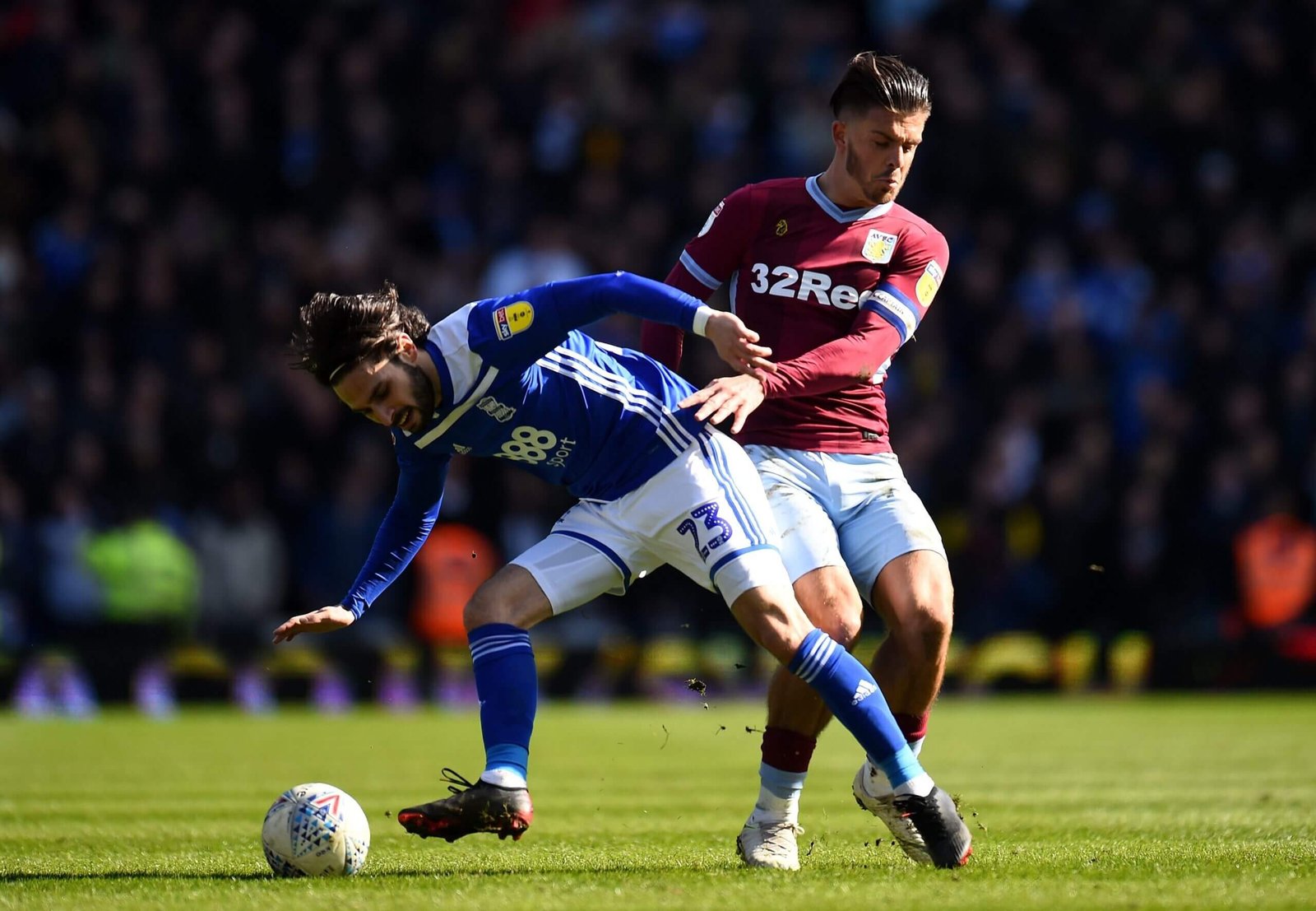Jota is at a Spanish airport, waiting to board yet another flight. This is the former Aston Villa and Birmingham City player’s life now — as he successfully pursues a career outside football.
The 32-year-old, who is speaking to The Athletic from said airport, has several meetings scheduled later in the day with interested parties who want to discuss his leading and novel agricultural technology company — where profit margins will soon reach a billion pounds.
It marks an extraordinary career divergence since the Spaniard retired from the game in October 2022.
By that stage, he had decided against a new three-year contract at La Liga side Alaves and accepted, in his mind, that football no longer created the joy in him it used to. For a player who had crossed one of the big divides in English football by joining Aston Villa from arch-rivals Birmingham City three years earlier, the desire to prove himself once more had diminished.
Jota, back then, was 27 years old and enthused by the idea of stepping up a division to play in the Premier League. Gary Gardner was sent the other way and the Spanish midfielder was again working under Dean Smith, the manager who had influenced his most prolific season in English football — when he scored 12 goals in 21 Championship appearances for Brentford in 2016-17, setting up a move to Birmingham that summer.
Smith had left Brentford for Villa just over a year later and Jota, living locally in Solihull and requiring little upheaval, was regarded as the creative dovetail alongside Jack Grealish — who was operating in the No 10 position — when they were reunited in summer 2018.
As it turned out, Jota at Villa proved to be an unmitigated damp squib. His two-year contract was cut short halfway through, having made only 16 appearances, including four league starts, during a period further soured by being headbutted by Danny Drinkwater during a training session.
Jota takes a tumble playing for Villa in pre-season in 2019 (Matthias Kern/Bongarts/Getty Images)
Though Jota has “no regrets” over the Drinkwater episode or his time at Villa in general, in hindsight, that period signalled the start of him losing his love for football.
“I was young (having just turned 31) and a lot of people tried to convince me not to retire,” he says. “I was playing a lot at Alaves, but the modern game has become more about systems and being athletic. I was a playmaker and a No 10, but you don’t see that anymore — Juan Roman Riquelme wouldn’t start (today) because stats and data are all based on how much you run rather than your technical talent, which is God’s gift. Players don’t get the freedom, it’s just a tactical game and everyone is machine-like.
“That was when I started losing motivation. A couple of years before, I was free to do what I wanted with the ball. Now every manager wants to play the same and training is about individual running. The No 10 has disappeared. There isn’t a player like Riquelme anymore — he would not play today.”
Jota, in his words, became “tired”. He approached training as work rather than with the child-like exuberance he used to feel. He enjoyed his time at Villa despite contrasting fortunes on the pitch but was no longer the “expressive” player of previous seasons.
“Football should make personalities stand out,” he says. “I was doing what the manager said, but I didn’t enjoy it. It was a difficult decision because I was saying no to so much money, but I had loved football so much it was never about the money. I lost my motivation, but I had another big project on my mind.”
The “project” Jota refers to perhaps plays down the scale of his first step outside of football.
He is the figurehead of Groinn, a company comprising 80 workers, including sub-contractors, with a close team of 10.
More strikingly, Groinn’s influence is far greater and global than its headcount suggests; Jota’s company is entering into a partnership with the Spanish government to provide digital agricultural aid and is projected to swell to a worth of £600million ($760m) in 2025. And that, he insists, is just the start of Groinn finalising such deals with other regions.
This year, Groinn aim to explore new markets in Portugal, northern Europe and North America. The Spanish government aims to invest in its technology and give it to the nation’s farmers, with the target being for every agriculturalist to have the software by 2030.

Jota tussles with future Villa team-mate Grealish while playing for Birmingham (Nathan Stirk/Getty Images)
After investing several million pounds into Groinn two years ago, immediately post-retirement and largely swayed by the advice of his close friends who had expertise in farming, Jota plans to open a second, brand-new headquarters outside his homeland.
Before he sat down to talk to The Athletic, Jota had been studying various locations as part of the process to decide where best to place the new facility.
“When I was playing, I knew about Groinn, but I didn’t have the time,” he says. “It was a start-up under a different name that required funding (it was then called Ramalloc Innovation). I like taking risks and there were nervous times during the process. Once you develop the technology and it works, you will have spent millions but will get a lot more back. But if it doesn’t work, you lose all your money.”
In essence, Groinn is a wireless plantation system that monitors the status of crops and large fields. It operates through sensors and can be accessed on any technological device, instructing farmers when to water the plants, when not to, the nutrients they need and how to prevent fires. It is the first device of its kind and improving crop yields is critical in mitigating the current dangers of increased forest fires and climate change.
“We have had ups and downs because we are investing so much money into something new that you don’t know will work,” he adds. “I feel extremely proud because I know a lot of people were saying to me, ‘This is crazy’. Now, these people are saying, ‘Oh my word, this is making huge money’.
“The value of the company is now worth 10 times more than the money I invested. I am already taking offers, but I know they won’t even be one per cent of its value in three years. We are in negotiations with a lot of governments around the world because they want the technology and we are industry leaders. We are talking to big companies in America and we are moving quicker than we thought.”
Before Jota’s investment, machines that held similar benefits would cost around £25,700 to manufacture and purchase. Groinn, as Jota says, can be made for £175, all stored within one small device. The investment needed to drive the software into production was funded through Jota, which totalled into the millions and gave him a significant controlling stake in the company. Groinn only officially entered the market last September.

Jota at Alaves in 2021 (Juan Manuel Serrano Arce/Getty Images)
“We are like the iPhone,” he says. “Before that, you had letters, fax machines and telephones, but the iPhone puts it all into one and doesn’t cost too much and will be better quality. We did the same in agriculture with all technology on one machine.”
In the first year alone, Groinn is expected to have 150,000 people using the software.
“I knew when I left football, I had something really big on my hands,” Jota says. “We’re not talking about opening up a restaurant — I’ve invested so much money into this. The value of the company has projections that show this will be the world’s biggest agriculture company in three years.”
Jota says financial forecasts in years two and three will see Groinn expand into large territories, including Asia. This has contributed to annual projections of the company being worth £600million in year two and then a sharp rise in year three to an eye-watering £3billion. Most of the profit will be reinvested into Groinn, with around a quarter being handed to its shareholders, including Jota.
“Our profit projections will be so big, no matter how much money someone offers me (for his stake), it will not be enough,” he insists.
Jota’s failure at Villa and subsequent drift at Alaves sowed the seeds — literally and figuratively — for his entrepreneurial enterprise. It has now reached the point where he is expected to forge a business empire that deals with sums of money beyond the realms of his imagination.
And with that, he tells The Athletic his plane is just about to take off.
“Our projections say we will make £1billion profit,” Jota concludes. “Imagine how much money it will make in a year. It’s crazy. I am working 24/7 to do that.”
(Top photo: Robbie Jay Barratt – AMA/Getty Images)
Read the full article here


